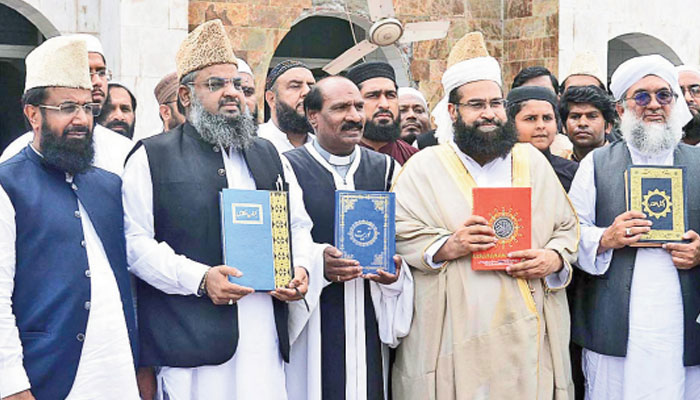Elusive harmony
Week aims to promote harmony between peoples regardless of their faith through dialogue
This past Saturday (February 1) marked the start of World Interfaith Harmony Week, celebrated annually in the first week of February since being designated by the UN General Assembly in 2010. The week aims to promote harmony between all peoples regardless of their faith through dialogue, mutual understanding and cooperation. Despite the opportunities for all three of these elements only rising with the growth of the internet and greater exchange of information across the world, the global landscape remains fraught with inter-religious tensions and persecutions, both within and across borders. For countries as religiously diverse as Pakistan, promoting inter-faith harmony has been particularly challenging. The violence in Kurram, Khyber Pakhtunkhwa that has led to the loss of over 200 lives and seen the region virtually cut off from the rest of the country is partly driven by sectarian tensions. And the resurgence of terror outfits like the TTP does not bode well for interfaith harmony, to say the least. Mob violence, often spurred by controversies and accusations of a religious nature, continues to remain a problem and one that may well be growing. These unproven accusations can lead to the targeted killings of individuals and the destruction of whole minority neighbourhoods by violent mobs. Rather than serving as a bulwark against such trends, the state has often been implicated in the violence, with the killing of a doctor in Sindh last year at the hands of the police a particularly egregious example of this problem. In this context, Prime Minister Shehbaz Sharif’s message to herald Interfaith Harmony Week, emphasising the need for dialogue, tolerance and cooperation between different religious groups, comes across more like a plea from the state to the intolerant rather than a firm stand for tolerance.
At the same time, there has clearly been a decline in interfaith harmony at the global level. Israel has killed almost 50,000 Palestinians and reduced the strip to an almost uninhabitable land of ruined buildings. According to some reports, Israel has destroyed almost 80 per cent of Gaza’s mosques and at least three churches. As much as the Zionist state’s massacre is about seizing land and denying the Palestinians their rightful statehood, it is also about demonising the oppressed group and even denying their existence as a recognisable nation. And Israel is far from alone. Across the West, a wave of right-wing parties and politicians has taken power off the back of rhetoric that demonises minorities and encourages xenophobia, particularly towards Muslims. The West no longer upholds the values of tolerance and pluralism or interfaith harmony, even if it continues to lecture everyone else about them.
However, just because the West has lost credibility on this issue does not mean that the principles themselves have been invalidated, something that many in the Global South often forget. While countries like Pakistan may no longer need to listen to lectures from the West about how to handle these issues, countering these trends through local solutions remains as imperative as ever. Inter-communal dialogue and understanding can only succeed in an environment where those who resort to violent bigotry are punished and deterred.

